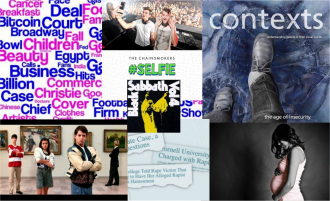 Semesters come and go, but The Society Pages, much like the rest of society, keeps on keeping on, summer, spring, winter, or fall. Last week we finished up delivering the content for our next TSP volume (Owned, a look at the new sociology of debt), this week we’ll have our editorial “Retreat to Move Forward” (h/t “30 Rock,” though without the Six Sigma), and next week we’ll deliver the content for the fifth TSP volume, a culture reader. Last week also saw the arrival of the latest issue of the ASA’s Contexts magazine, with all content available online for free for the first time ever. Like anyone, when we’re mired in this much work, it’s often hard to see the milestones as true achievements or notice the big picture project that’s getting accomplished day by day. To that end, let me be the first to say congratulations to The Society Pages on its first five books, its first two years, and its tremendous achievements in using sociology to contextualize the news.
Semesters come and go, but The Society Pages, much like the rest of society, keeps on keeping on, summer, spring, winter, or fall. Last week we finished up delivering the content for our next TSP volume (Owned, a look at the new sociology of debt), this week we’ll have our editorial “Retreat to Move Forward” (h/t “30 Rock,” though without the Six Sigma), and next week we’ll deliver the content for the fifth TSP volume, a culture reader. Last week also saw the arrival of the latest issue of the ASA’s Contexts magazine, with all content available online for free for the first time ever. Like anyone, when we’re mired in this much work, it’s often hard to see the milestones as true achievements or notice the big picture project that’s getting accomplished day by day. To that end, let me be the first to say congratulations to The Society Pages on its first five books, its first two years, and its tremendous achievements in using sociology to contextualize the news.
Contexts Magazine:
Spring 2014 includes “The Terrorists Next Door,” “Little Free Libraries,” Ruling Out Rape,” and “Working Class Growing Pains,” among much other great scholarship. Click through to read and share the full issue!
There’s Research on That!
“Mass Shootings and the ‘Man’ifesto,” by Evan Stewart. “Mass shootings are rare, but the culture that creates them is not.”
“How to Give Birth the ‘Right’ Way,” by Jacqui Frost. On the medicalization of childbirth, safety, and social control.
Roundtables:
“The Enduring Effect of Online Mug Shots,” by Sarah Lageson. Just imagine: your aunt Googles you because she can’t remember what college you went to. Now she knows you were arrested for DUI eight years ago. What purposes do online mugshots serve?
Office Hours:
“Peter McGraw and Joel Warner on Humor,” with Richie LeDonne. Humor and the power of subversion.
The Reading List:
“Art Goes for Looks, Patrons Go for Status,” by Evan Stewart.
Citings & Sightings:
“Reproducing Reality in Fantasy-Land: Online Gaming and Offline Behaviors,” by Letta Page.
“Alice Goffman: Telling the Tale of Extreme Ethnography,” by Amy August.
Scholars Strategy Network:
“Make the First Two Years of College Free—A Cost-Effective Way to Expand Access to Higher Education in America,” by Sarah Goldrick-Rab and Nancy Kendall.
A Few From the Community Pages:
- Chris Uggen writes “Elliot Rodger and Violence Against Women,” adding real data to real tragedy on Public Criminology.
- Sociological Images takes a look at persistent racism, sexist headlines, the appropriation of the swastika, and that New Orleans’ staple: the go-cup. They reiterate the best advice for college grads this side of the Internet and analyze gender and reporting the nation’s newspaper of record.
- Girl w/ Pen! takes on a new study that shows women who work still feel more stressed when they’re at home than at the office, suggesting flexible work options might lessen the load, increasing productivity and productive leisure.
- Cyborgology on adding new words to the dictionary, new privacy settings to Facebook, and new earworms via the “Selfie” song.
- New Books in Sociology interviews the authors of “Social Insecurity: 401(k)s and the Retirement Crisis” and “No Book But the World.”

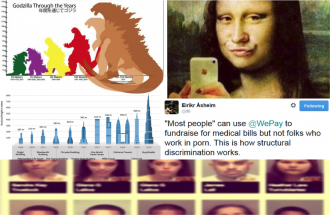
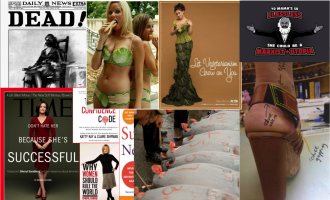
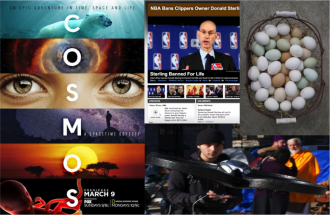
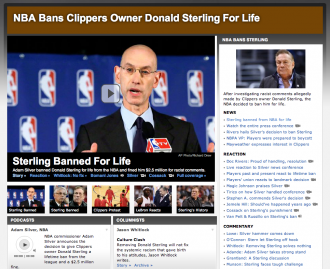
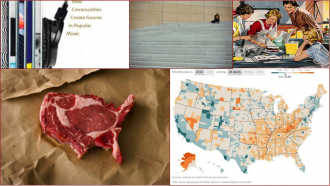

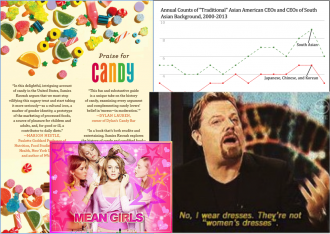 A tag-cloud for this week’s roundup might be astounding and jarring, since it runs the gamut from candy and cohabitation to affirmative action revision, diversity trends among the powerful, community health centers in Texas, and 20 years of remembrance in Rwanda. Herewith: what we’ve been up to this week.
A tag-cloud for this week’s roundup might be astounding and jarring, since it runs the gamut from candy and cohabitation to affirmative action revision, diversity trends among the powerful, community health centers in Texas, and 20 years of remembrance in Rwanda. Herewith: what we’ve been up to this week.